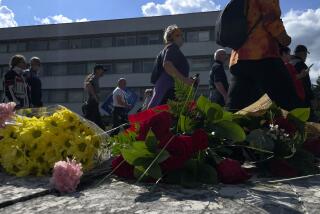Ally of Milosevic’s Wife Shot to Death
- Share via
SARAJEVO, Bosnia-Herzegovina — A senior Yugoslav official who was a close associate of Slobodan Milosevic’s powerful wife was shot to death execution-style Friday in a busy Belgrade suburb, police said.
It was the third killing this year to touch the inner circle of the Yugoslav president’s family.
Zoran Todorovic, a wealthy businessman who headed Yugoslavia’s second-largest oil company, was shot to death as he stepped from his Audi outside the firm’s headquarters in the capital, radio reports in Belgrade said. Todorovic was secretary-general of the Yugoslav United Left, the neo-Communist political party founded by Milosevic’s wife, Mirjana Markovic.
Considered a leftist hard-liner, Todorovic, 38, who at times attacked the notion of multi-party democracy, was probably Markovic’s closest confidant. The United Left is a member of the ruling coalition led by Milosevic’s Socialist Party.
Possible motives for the killing ranged from politics to business rivalry in a country where well-connected gangs control most trade and commerce.
“The shot at our comrade is a shot at our nation,” the United Left said in a statement. “It is a shot at peace, freedom and dignity . . . and an attempt to destabilize our homeland.”
Todorovic’s bodyguard was wounded in the shooting.
In April, one of Milosevic’s most trusted aides and head of his dreaded security apparatus, Radovan Stojicic, was shot to death in a similar gangland-type slaying as he sat in the crowded Mama Mia restaurant in downtown Belgrade.
“If [Stojicic’s] killing brought death to the doorstep of the Milosevic home, today’s murder reaches at least into the living room,” said Dragoljub Zarkovic, editor of the Vreme newsmagazine.
Unlike Todorovic, Stojicic was heavily involved in Yugoslavia’s wartime role in Bosnia-Herzegovina and Croatia. At Milosevic’s behest, Stojicic armed ethnic Serbs and fought with a brutal paramilitary squad.
In theory, Stojicic could have implicated Milosevic in war crimes, something that added a possible motive to his slaying.
Todorovic, however, had no known role in the warfare. Regarded as one of the richest men in Yugoslavia, he owed his prosperity to the political clout he gained as Markovic’s friend and colleague.
Through the Milosevic couple, he was granted exclusive rights to the export and import of strategic commodities such as copper and wheat. He also had extensive real estate holdings.
Newspapers frequently linked him to murky business deals and financial scandals that have multiplied in Yugoslavia after international sanctions, imposed because of Milosevic’s role in fomenting the warfare, helped to criminalize the country’s economy.
“He showed entrepreneurial skills during the complicated times of sanctions,” state television said--a veiled reference to his ability to smuggle petroleum, then considered a patriotic achievement.
The killing sent a shudder through Belgrade’s political elite.
“Not a single citizen can feel safe,” intoned the nationalist Serbian Radical Party, whose leader came in first in an inconclusive presidential election earlier this month in Serbia, which along with the smaller Montenegro makes up the rump Yugoslavia.
For Milosevic, especially, the seemingly precision professional slayings come at a time of uncertainty. His political fortunes are suffering because of recent electoral victories by opponents, and his power appears to be facing its most serious threat.
In February, Vlada Kovacevic, a close friend of Milosevic’s flamboyant son, Marko, was killed in an ambush at a shopping mall. Kovacevic had been active in Serbia’s thriving black market in smuggled cigarettes and cars.
No suspects have been arrested in the deaths of Kovacevic or Stojicic.
More to Read
Sign up for Essential California
The most important California stories and recommendations in your inbox every morning.
You may occasionally receive promotional content from the Los Angeles Times.














